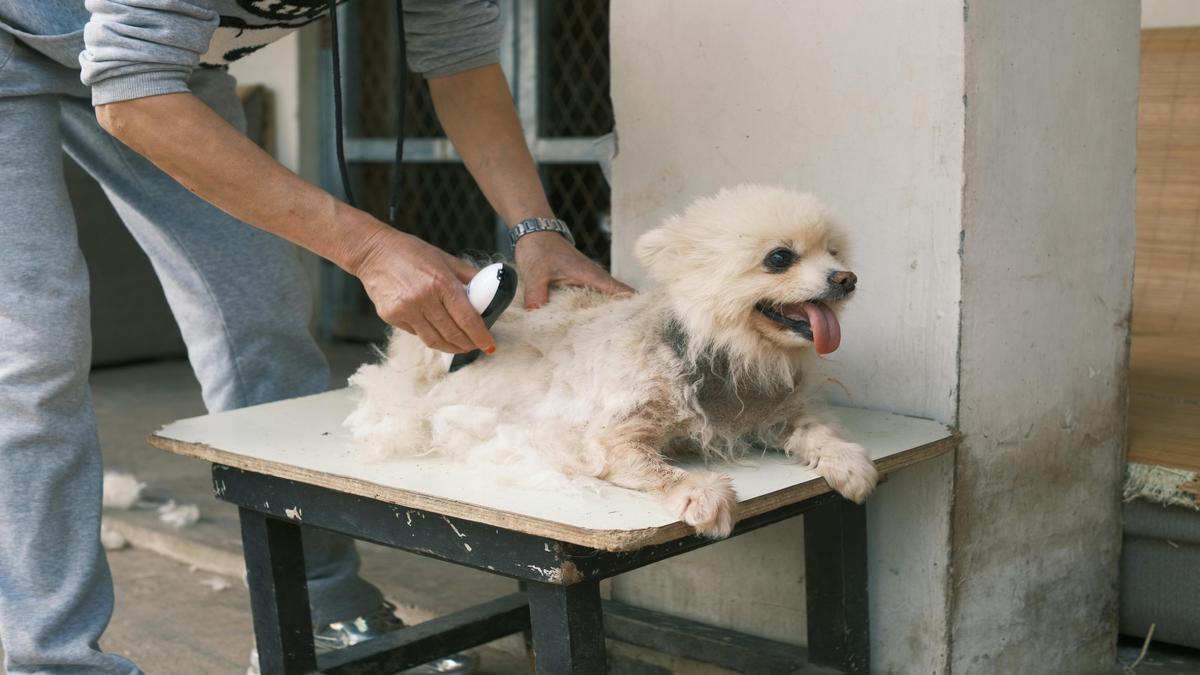Constant Scratching: Allergies, Parasites, or Skin Issues
Are you constantly frustrated by your dog’s constant scratching? It could be due to allergies, parasites, or skin issues. Understanding the root cause is crucial in finding relief for your furry friend. From exploring behavioral triggers to effective treatment options, this article will guide you through identifying, managing, and preventing skin problems and allergies in your dog. Keep reading to discover how to ensure a happy and healthy life for your beloved canine companion.
Key Takeaways
- Regular grooming is essential for your dog’s skin health.
- Check for fleas and ticks regularly on your dog’s fur.
- Ensure your dog has a balanced diet to prevent skin allergies.
- Consult with a vet if your dog’s scratching persists.
- Keep your home clean to prevent skin irritants for your dog.

Identifying the Root Cause of Your Dog’s Constant Scratching
Understanding Your Dog’s Itchy Skin
If your furry friend is constantly scratching, it’s essential to understand the root cause of their discomfort. Itchy skin can be quite bothersome for dogs, leading to incessant scratching and discomfort. Dogs can’t tell us when something is wrong, so it’s up to us to decode their behavior and address the issue.
Recognizing Allergies, Parasites, or Skin Issues
When it comes to Constant Scratching: Allergies, Parasites, or Skin Issues, there are a few common culprits to consider. It could be allergies, parasites, or underlying skin problems causing your dog’s distress. Let’s delve into each to help you pinpoint the source of your dog’s discomfort:
Common Allergens Causing Skin Irritation
| Allergen | Symptoms |
|---|---|
| Pollen | Sneezing, Itchy Skin, Watery Eyes |
| Dust Mites | Scratching, Hair Loss, Redness |
| Food Allergies | Digestive Issues, Itchy Ears |
| Flea Bites | Red Bumps, Excessive Scratching |
| Mold | Itchy Paws, Skin Infections |
By recognizing these common allergens, you can better understand what might be triggering your dog’s itchy skin and take appropriate action to provide relief.
Behavioral Triggers for Excessive Scratching in Dogs
Exploring Your Dog’s Scratching Behavior
When your furry friend is constantly scratching, it can be a sign of underlying issues that need to be addressed. Understanding why your dog is scratching excessively is crucial in providing the appropriate care and relief. Here are some common behavioral triggers for constant scratching in dogs:
| Behavioral Triggers | Description |
|---|---|
| Allergies | Sensitivities to certain foods, environmental factors, or grooming products can lead to itchiness and irritation. |
| Parasites | Fleas, ticks, and mites can cause intense itching and discomfort for your dog. |
| Skin Issues | Conditions like dermatitis, dry skin, or infections can result in persistent scratching. |
Addressing Stress and Anxiety in Canines
Stress and anxiety can manifest in various ways in dogs, including excessive scratching. It’s essential to identify and address these emotional factors to help your furry companion feel calm and secure. Here are some strategies for managing stress and anxiety in dogs:
- Regular exercise to release pent-up energy.
- Creating a safe space for your dog to retreat to.
- Behavioral training to promote positive behaviors.
- Calming supplements or medications recommended by your veterinarian.
Managing Behavioral Causes of Constant Scratching
To effectively manage the behavioral causes of constant scratching in dogs, it’s crucial to take a holistic approach that addresses the root causes. By combining proper care, attention, and training, you can help your canine companion find relief and comfort. Remember, each dog is unique, so tailor your approach to suit your pet’s specific needs.

Effective Treatment Options for Dog Skin Issues
Dermatitis in Dogs: Causes and Symptoms
Skin issues in dogs, such as dermatitis, can be a source of discomfort for your furry friend. Dermatitis can be caused by various factors, including allergies, parasites, or underlying skin issues. Common symptoms of dermatitis in dogs include itching, redness, flakiness, and hair loss. It’s essential to pay attention to these signs to address the issue promptly.
Topical Treatments for Alleviating Skin Irritation
When it comes to alleviating skin irritation in dogs, topical treatments can be highly effective. These treatments can help soothe the skin, reduce itching, and promote healing. Some topical treatments that can be beneficial for skin issues in dogs include:
| Treatment | Benefits |
|---|---|
| Oatmeal Shampoos | Gentle on the skin and helps with itching |
| Aloe Vera Gel | Soothes irritated skin and promotes healing |
| Coconut Oil | Moisturizes the skin and has antibacterial properties |
| Calendula Cream | Anti-inflammatory properties for skin relief |
Consulting a Veterinarian for Skin Issue Diagnosis
If your dog is experiencing skin issues, it is advisable to consult a veterinarian for a proper diagnosis. A veterinarian can examine your dog’s skin, identify the underlying cause of the issue, and recommend the best course of treatment. Professional guidance is crucial in addressing skin problems effectively and ensuring your dog’s well-being.
Preventing Skin Problems and Allergies in Dogs
Understanding the Role of Diet in Skin Health
When it comes to preventing skin problems and allergies in dogs, understanding the impact of diet is crucial. A balanced and nutritious diet plays a significant role in maintaining your furry friend’s skin health. Just like humans, dogs can also suffer from skin issues if their diet lacks essential nutrients.
To ensure your dog’s skin stays healthy, make sure their diet is rich in Omega-3 fatty acids, Vitamins A and E, and protein. These nutrients help promote a healthy skin barrier and reduce inflammation. Additionally, hydration is key to maintaining skin health, so always provide your dog with access to fresh water.
Grooming Tips to Maintain Healthy Skin
Proper grooming is essential for maintaining healthy skin in dogs. Regular brushing helps remove dirt, debris, and loose fur that can contribute to skin irritation. It also stimulates oil production in the skin, which helps keep the coat healthy and shiny.
In addition to brushing, bathing your dog with a mild shampoo designed for dogs can help keep their skin clean and free of irritants. Be sure to dry your dog thoroughly after a bath to prevent moisture-related skin issues.
Environmental Factors Contributing to Skin Irritation
Environmental factors can also play a role in skin irritation for dogs. Allergens such as pollen, dust, and mold can trigger allergic reactions in dogs, leading to itchy and inflamed skin. Parasites like fleas and ticks can also cause skin irritation and lead to constant scratching.
To minimize your dog’s exposure to environmental irritants, consider limiting outdoor time during peak allergy seasons and using flea and tick preventatives. Regular cleaning of your home can also help reduce allergens that may affect your dog’s skin.

Maintaining Your Dog’s Skin Health for Long-Term Relief
Importance of Regular Vet Check-ups
Regular vet check-ups are crucial for maintaining your dog’s overall health, including their skin. A veterinarian can identify any skin issues early on and provide the necessary treatment to prevent them from escalating. These check-ups also ensure that your furry friend is up to date on vaccinations and preventative medications that can help keep their skin healthy.
Creating a Skin Care Routine for Your Canine Companion
When it comes to your dog’s skin health, a consistent skin care routine is key to ensuring they have long-term relief from any skin problems. Here are some tips to help you create a skin care routine tailored to your canine companion:
| Skin Care Routine Tips |
|---|
| 1. Regular Bathing: Use a gentle dog shampoo to keep your dog’s skin clean and moisturized. Avoid bathing them too frequently as it can strip their skin of natural oils. |
| 2. Brushing: Regular brushing helps remove dead skin cells and distribute natural oils for a healthy coat. |
| 3. Healthy Diet: Feed your dog a nutritious diet rich in essential nutrients like Omega-3 fatty acids to promote healthy skin. |
| 4. Supplements: Consider adding skin supplements like fish oil to their diet for extra skin support. |
| 5. Regular Vet Visits: Schedule annual vet check-ups to monitor your dog’s skin health and address any concerns promptly. |
Ensuring a Happy and Healthy Dog
By maintaining your dog’s skin health through regular vet check-ups and a dedicated skin care routine, you are not only promoting their physical well-being but also enhancing their overall quality of life. A healthy skin is a happy skin, and a happy dog is a joyful companion to have by your side.
Seeking Professional Help for Persistent Scratching Issues
When to Consult a Veterinarian for Dog Skin Problems
If your furry friend is constantly scratching, it may be a sign of a more significant issue. Persistent scratching can be caused by various factors such as allergies, parasites, or skin problems. While occasional scratching is normal, excessive scratching could indicate an underlying problem. Here are some signs that indicate it’s time to seek professional help from a veterinarian:
- Persistent Scratching: If your dog is scratching constantly and seems uncomfortable.
- Visible Skin Irritation: If you notice redness, inflammation, or sores on your dog’s skin.
- Hair Loss: Excessive scratching can lead to hair loss in certain areas.
- Changes in Behavior: If your dog seems agitated or restless due to the itching.
If you notice any of these signs, it’s essential to consult a veterinarian promptly. They can diagnose the issue and recommend the appropriate treatment.
Allergy Testing and Treatment Options
Allergies are a common cause of itchy skin in dogs. Your veterinarian may recommend allergy testing to determine the specific allergens that are causing your dog’s discomfort. Once the allergens are identified, your vet can recommend treatment options tailored to your dog’s needs. Here are some common allergy treatment options:
| Allergy Treatment Options |
|---|
| Antihistamines |
| Steroids |
| Immunotherapy |
| Specialized Diets |
Each dog is different, so it’s essential to find the right solution that works best for your furry companion.
Finding the Right Solution for Your Itchy Dog
When it comes to addressing your dog’s persistent scratching issues, it’s crucial to find the underlying cause. Whether it’s allergies, parasites, or skin problems, a veterinarian can help you navigate the complexities of your dog’s condition. By seeking professional help, you can uncover the secrets behind your dog’s discomfort and find a bespoke treatment plan that is meticulously tailored towards their needs.
Frequently asked questions
Why is my dog constantly scratching?
- Your dog may be constantly scratching due to allergies, parasites, or skin issues.
How can I tell if my dog has allergies?
- Look out for symptoms like itching, redness, sneezing, and runny eyes to determine if your dog has allergies.
What are common parasites that can cause itching in dogs?
- Common parasites that can cause itching in dogs include fleas, ticks, and mites.
How can I help relieve my dog’s itching?
- Regular grooming, a balanced diet, flea prevention, and medication prescribed by your vet can help relieve your dog’s itching.
When should I take my dog to the vet for constant scratching?
- If your dog’s scratching is severe, persistent, or accompanied by other symptoms, it’s best to consult with your vet for a proper diagnosis and treatment plan.

